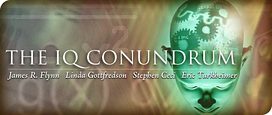Reviewing the contributions of Ceci and Turkheimer, I still agree with Ceci. For these reasons:
(1) What is offensive should not be discouraged as a subject for rational discussion. I do not doubt that discussion of group differences is offensive particularly to groups where the hypotheses reflect unfavorable stereotypes. Until recently anything that contradicted scripture was offensive: “do you mean to say these people were lying about Christ?”
(2) Scientists have no veto power over what most people say about groups. Group stereotypes existed in simplistic form prior to the rise of science. Does anyone believe they would be less vicious today if Turkheimer’s view had always inhibited rational discussion of the abilities of different races? What about his discussion of the fallacies of talking about “innate”? Was that in bad taste? He may call it a philosophical point but he brings a galaxy of scientific findings to bear to debunk it.
(3) Or are we just to discourage discussions about race that various groups dislike rather than like? As for my group, Irish-Americans, I welcome a no-holds-barred discussion of the roots of our high rates of alcoholism.
(4) When we do not like a discussion, there is always a temptation to raise the bar as to what would count as evidence to a height no social science can meet. Turkheimer should not ask what would convince the race scientists they were wrong, rather he should ask what would convince good scientists that their hypotheses were wrong. His question introduces an ad hominem element in that it implies that his opponents are biased in some way that a good scientist is not. Otherwise there is no reason to single them out as particularly recalcitrant.
(5) I have little doubt as to what would make me conclude they were wrong with finality (as distinct from my present position that they are probably wrong). Evidence of the sort we got from Eyferth’s study of black and white occupation children in Germany from a number of nations, with larger numbers, ages going to maturity, and fewer ambiguities.
(6) Is it not legitimate to ask exactly what would convince people like me and Turkheimer that we were wrong? If we are to ask this of others, a prerequisite would be to first answer it ourselves. I have done so by implication (negative results from a series of studies like Eyferth’s but better), but I can imagine data from progressive knowledge of the human genome. Can Turkheimer not imagine evidence that would settle the issue for any fair-minded person? And if not, what a peculiar exception to all the questions posed by the sciences of man.

